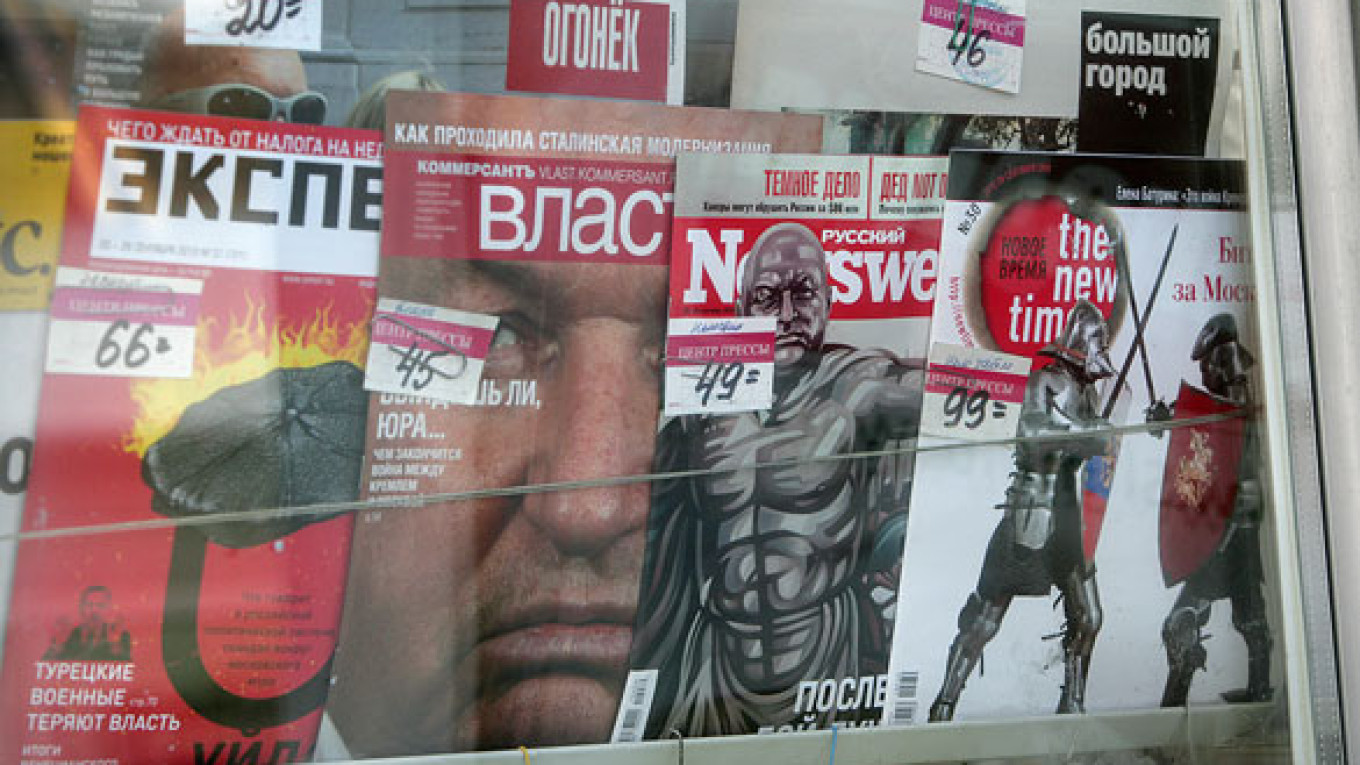Newsweek's Russian edition ceased publication Monday after the weekly failed to break even during nearly six years of publication, said its publisher, Axel Springer Russia.
The decision was deplored by journalists as another sign of readers' limited appetite for political news, and one Newsweek source complained that the Kremlin had thwarted talks to sell to an investor.
The closure was announced by Axel Springer Russia's CEO, Regina von Flemming, at a Monday morning meeting with the magazine's 50 staff members. "Regina said good morning and burst into tears," Russian Newsweek's national news editor Mikhail Zygar wrote on his blog.
Launched in late 2004, the magazine, with an official print run of 50,000 and a national readership of more than 200,000, had won praise for its serious and critical reporting but never made it out of the red.
"Unfortunately, we have failed to bring the magazine to a firm economic base, and we could not create a prosperous perspective," Ralph ?
Büchi, the executive who oversees international operations at Germany's Axel Springer AG, said in a statement on the magazine's web site.
The German media giant also publishes Russian editions of Forbes and the gossip magazine OK. Earlier this year, it acquired the operations of German rival Gruner & Jahr, which mainly consist of the Russian version of scientific magazine Geo.
Springer's Russia division wants to "acquire a profitable business in the future,” Büchi said.
The company did not release figures, but analysts have estimated Russian Newsweek's annual loss at about $500,000.
A media report last month said Axel Springer had decided against renewing its license agreement with Newsweek Inc. and was in talks with billionaire Mikhail Prokhorov to hand him the magazine.
Prokhorov, who owns the Snob and Russky Pioner magazines and the RBK media holding, rejected the offer after failing to get approval from the Kremlin, a source in the Newsweek newsroom said Monday, echoing a report on the online edition of Germany's Der Spiegel magazine.
Prokhorov's spokesman Igor Petrov confirmed that "early stage" talks had been conducted with Axel Springer. But he added that he did not know why they were discontinued and that reports about Kremlin interference were not credible.
Kremlin spokespeople were not available for comment Monday.
Leonid Parfyonov, a well-known television journalist who served as Russian Newsweek's first editor until 2007, said the magazine's demise indicated Russians' general lack of interest in political reporting and analysis.
"Sadly, only business publications prove to be successful in our country," he told The Moscow Times.
Parfyonov's successor Mikhail Fishman made headlines earlier this year when he appeared in a YouTube video that showed him snorting cocaine with prostitutes. Axel Springer said at the time that he had become a victim of a targeted campaign.
On Monday, the company said Fishman would remain on its staff as a correspondent for its Welt newspaper group.
Newsweek's main U.S. edition has also been loss-making in recent years. This summer, it was sold by the Washington Post Company for a reported $1 to businessman Sidney Harman, 92.
Novaya Gazeta said Monday that it might face closure after a Moscow court threw out its appeal over an extremism warning from the federal media watchdog.
"You might not see Novaya Gazeta again next year," deputy editor Sergei Sokolov wrote on the newspaper's blog.
The newspaper lost a civil suit against the warning last month, Sokolov said.
The watchdog issued the warning for inciting ethnic hatred on March 31 after the opposition-minded newspaper described the program of ultranationalist group Russky Obraz in an article in January.
By law, the watchdog can ask a court to shut down a media outlet after two warnings. This is Novaya Gazeta’s first.
A Message from The Moscow Times:
Dear readers,
We are facing unprecedented challenges. Russia's Prosecutor General's Office has designated The Moscow Times as an "undesirable" organization, criminalizing our work and putting our staff at risk of prosecution. This follows our earlier unjust labeling as a "foreign agent."
These actions are direct attempts to silence independent journalism in Russia. The authorities claim our work "discredits the decisions of the Russian leadership." We see things differently: we strive to provide accurate, unbiased reporting on Russia.
We, the journalists of The Moscow Times, refuse to be silenced. But to continue our work, we need your help.
Your support, no matter how small, makes a world of difference. If you can, please support us monthly starting from just $2. It's quick to set up, and every contribution makes a significant impact.
By supporting The Moscow Times, you're defending open, independent journalism in the face of repression. Thank you for standing with us.
Remind me later.


